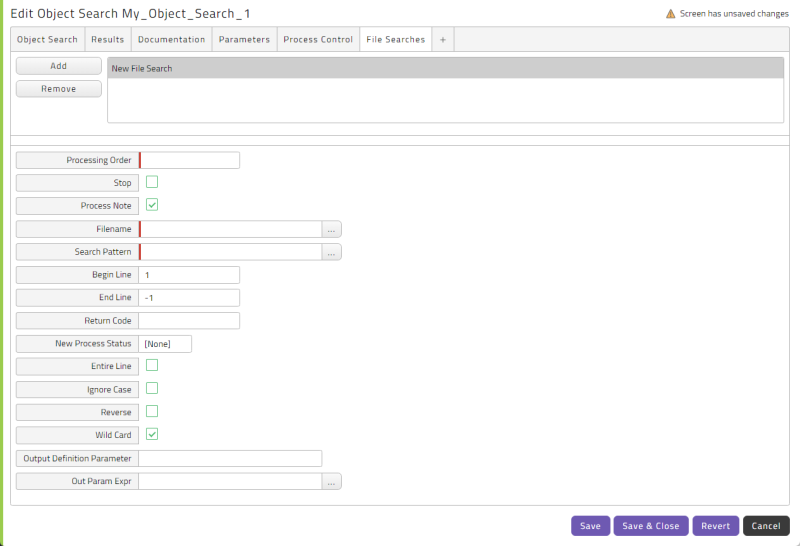Process Definitions: File Searches Tab
File searches let you easily search for errors or warnings in log files and set the status of the process accordingly. You can use a file search to parse output and log files for a specific string pattern, then force the process to a specific status when the file matches the pattern. You can also store the matched string (or some part of it) in an Out parameter.

| Field | Description |
|---|---|
| Processing Order | Sequence number for this file search. File searches are performed in sequence based on their Processing Order values, until a file search is matched that has the Stop property checked or the last file search has been performed. |
| Stop | Specifies a file search that will prevent any further file searches to be performed if matched. |
| Process Note | Lets you add a note to the process with the result of the file search. |
| File | The name of the file to search for. You can use glob matching. |
| Search Pattern | The pattern to search for in the file. If Wild Card is checked, you can use glob matching. |
| Begin Line | The line at which to begin the search. Use -1 and check Reverse to start from the end of the file. |
| End Line | The line after which to stop the search. If Reverse is checked, lines are counted from the end of the file. Specify -1 to end the search at the last line. |
| Return Code | The return code to assign to the matching process (if any). |
| New Process Status | The status to assign to the matching process. |
| Entire Line | If this is checked, the pattern must match the entire line, not just a substring of the line. |
| Ignore Case | If this is checked, the search is case-insensitive. |
| Reverse | Check this box to initiate the search from the end of the file. |
| Wild Card | Allow the use of glob matching in Search Pattern. |
| Output Definition Parameter | The Out parameter to use to store the matched line. |
| Out Param Expr | REL expression for the Out parameter value. The built-in variable line contains the string of the line matching the search criteria. |
If the Process Definition is using the file search feature, and there is also a Post Running action configured on the Actions tab and/or a trigger has been created using the Before Process Post Running trigger option in the Scripting > Triggers module, the file search is executed first. In the case when all three options are configured, they are executed in the order listed below.
- File search
- Before Process Post Running Trigger
- Post Running Action
Example
Assume you have a process that does not always return a return code greater than 0 when errors occur, and you want RunMyJobs to look for a specific error message in the log. Assume you want to create a note indicating the error and store the matched line in the Out parameter P_Error_Code so you can quickly see what the error was. The process in question runs a PL/SQL script, and you want to detect Oracle ORA-12345 errors.
- Navigate to Definitions > Processes.
- Select Edit from the context menu of the Process Definition in question.
- On the File Searches tab, click Add.
- Enter the data from the following table into the fields, then click Save & Close.
| Field | Value |
|---|---|
| Processing Order | 0
|
| Stop | Checked |
| Note | Checked |
| File | stderr.log
|
| Search Pattern | ORA-*
|
| Begin Line | 1
|
| End Line | -1
|
| Return Code | 1
|
| New Status | Error |
| Entire Line | Checked |
| Ignore Case |
Unchecked |
| Reverse |
Unchecked |
| Wild Card | Checked |
| Output Definition Parameter | P_Error_Code
|
| Out Parameter Expression | =line.substring(12)
|